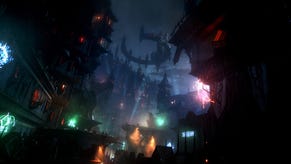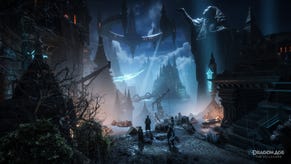Dragon Age 3: Inquisition confirmed, first details emerge
Dragon Age 3: Inquisition has been confirmed by EA for release late 2013. It will run on a new engine, as well as Frostbite 2 and is being developed by the Dragon Age: Origins team. Read all the details here.
The publisher confirmed the game officially over at its official blog, along with an open letter from BioWare's Mark Darrah.
Darrah's open letter explains that the studio didn't want to keep on hiding the fact that he game exists, especially following rumours that EA was focus testing for the Dragon Age 3.
Darrah writes, "Recently, I said that we didn´t want to talk about Dragon Age III unless we had something to show. I´m trying to stick to that plan and won´t be revealing much today. That said, a lot of information and rumors have surfaced recently and we don´t want to hide from them. There are a BUNCH of things that I really want to share with you but I want to do this right, and doing it right requires some more time."
He then went on to confirm that the official title is - of course - Dragon Age 3: Inquisition, but stressed that he wouldn't be sharing anything regarding the game's story. He did confirm however that it's being developed by the same team that worked on Dragon Age: Origins.
Darrah added, "We are working on a new engine which we believe will allow us to deliver a more expansive world, better visuals, more reactivity to player choices, and more customization. At PAX East, we talked about armour and followers . Yeah, that kind of customisation. We've started with Frostbite 2 from DICE as a foundation to accomplish this."
The news follows an alleged Dragon Age 3 plot synopsis leaking on the BioWare social forums last month. Here's what it said:
“A portal between the worlds unleashes hords of demons in the land, civil wars rip apart nations and the corruption is limitless. Someone is behind the shadows, drawing the threads which destroy the world. Time has come for the Inquisition.”
“Take the Inquisitor’s cloak and lead the only force able of bringing light into the darkness. Choose the direct method and gather your armies, send spies into the shadows or engage in a political war, make friends and use your connections indirectly: it is up to you how you lead the inquisition.”
“But you’ll have to take lead of it from the beginning. Make your player a rogue, warrior or mage and set up your crew from up to ten complex companions to lead them against those who attack you by systematically spying on, revealing and destroying them.”
OPINION: EA + Frostbite = Success?
Dragon Age 3: Inquisition joins a long and growing list of EA-published IP utilising DICE's Frostbite 2 engine. It's clear that the publisher values the tech and wants to see other studios adopting it. Battlefield 3 proved just how powerful the engine can be, so it's natural that EA wants to explore those possibilities further.
It's an approach that both echoes and lends creedence to Sony and Microsoft's handling of third-party acquisitions. Sony in particular frequently and unashamedly highlights its family of studios - from Naughty Dog to Media Molecule - and the way they share tech, ideas and development duties.
Microsoft operates the same way, but isn't as vocal about it. Perhaps it should be? After all, EA's use of Frostbite and its ever-growing marquee of big name studios and tech are definitely worth shouting about, and these talent clusters are starting to form under other publishers as well - just look at Square-Enix, IO Interactive, Eidos Montreal and Crystal Dynamics for one example.
But back to EA and Frostbite 2. Say what you will about the cookie-cutter nature of the recently unveiled Army of Two: The Devil's Cartel. It's by the numbers shooting at its most mundane, but Frostbite 2 makes the action sing, and the same rings true for Dead Space 3 and Need For Speed: Most Wanted.
At a time where action, spectacle, movie-like adrenaline and the notion of 'the big show' make money, then spreading Frostbite 2 around to enhance that experience significantly makes perfect sense. We all want to have fun while we play, and Frostbite 2 certainly results in a lot of fun.
Going back to a pure development level, sharing tech in this manner enables studios to cut often-crippling costs, manage time and resources, as well as simply upping the quality of IP.
If this practice continues tin greater depth and with other tech and engines, then it could just secure EA's financial standing and quality barometer going into the next generation. Let's not forget that it's also working with CryEngine developer Crytek.
Can you imagine a world where every EA game was powered by CryEngine? It's wishful thinking of course, but doesn't it just make for a sweet vision?
Let us know your thoughts below.











